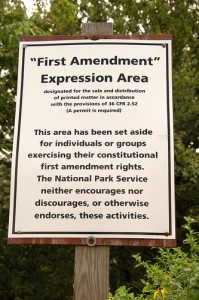An evangelical Christian, Brian Johnson, sought to distribute Bibles at a gay-pride festival in a public park.
The park board would not allow it.
It had adopted a policy limiting literature distribution to confined areas, due to security concerns and the festival’s size.
Johnson claimed the policy violated the First Amendment, and sought an injunction barring its enforcement. In a 2-1 decision released Wednesday, Johnson v. Minneapolis Park and Recreation Bd., the Eighth Circuit ruled that Johnson would likely prevail on his claim.
The Board’s policy restricted literature distribution to three locations:
- Festival booths, which must be approved by the festival’s organizers,
- “Board-sponsored booth[s]” within the Park but outside the confines of the Festival, and
- a “material drop area” within the Festival, where any person may leave noncommercial literature unattended.
The Board claimed the policy furthered its interests in “maintaining an orderly flow of people, providing access for security and emergency vehicles, and facilitating the activities of the participants of the Festival.”
The court recognized that distributing Bibles is protected speech that triggers First Amendment protection, and assumed that the board’s policy did not regulate speech based on content. It therefore asked if the regulation was a permissible time, place, and manner regulation: whether it is “narrowly tailored to serve a significant governmental interest, and . . . leave[s] open ample alternative channels for communication of the information.”
But the court applied an aggressive version of this test.
It stressed that the facts must show “a real need” for the government to act to protect its interests: “It is not enough for the Board to recite an interest that is significant in the abstract; there must be a genuine nexus between the regulation and the interest it seeks to serve.”
The court found that although controlling crowds “can constitute a significant governmental interest that bears directly on public safety,” the Board here presented “little evidence” that the rule here furthers its interests. The only affidavit that the Board offered was, in the court’s view, “at best ambiguous.” The court also found that the regulation was underinclusive, because the Board had also permitted street performers and solicitation.
In dissent, Judge Bye would have upheld the regulation. In his view, the regulation is narrowly tailored to serve a significant government interest. He found the case indistinguishable from Heffron v. Int’l Society for Krishna Consciousness, 452 U.S. 640, 650 (1981), where the Court upheld a rule that confined literature distribution to a booth. He further stressed that the Board had left “ample alternative channels of communication”:
Johnson can attend the Festival, engage in conversations with other attendees, wear expressive clothing, carry a sign conveying his message, and distribute Bibles from both the “materials drop” booth within the park and from his own booth outside the Festival. Johnson argues his preferred form of speech is personally handing a Bible to someone in the Festival, but the fact that one method of communication is preferred does not render alternatives necessarily inadequate

